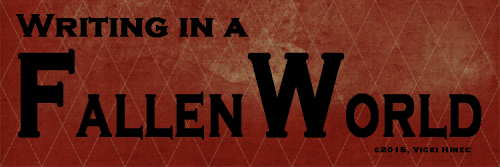We live in a fallen world. We are human, we make mistakes. A lot of mistakes.
As human beings, these mistakes generate conflict and challenges for us and for others. That’s great for writers who rely on conflict as spines for stories, but it makes real life hard on the mind, body and soul.
Fiction emulates life. Simulates life. So writers observe, view, and then reveal the truth as they see it at that time in their work. They choose what to write (and not write). What to include (and not include). Where to place emphasis (and what to ignore). This is how writers craft stories that move readers’ emotions and nudge readers into thinking and reacting the way writers want readers to perceive, think, and react when reading the story.
This has worked since the inception of fiction writing. In no small part, due to the lines between good and evil being clearly delineated both inside and outside the book. Of course, there have been stories where corruption and greed and all manner of evil were glamorized, but because the lines were so evident outside of the work, it was evident to the reader that they were seeing evil glamorized and not reality.
In a fallen world, the lines are more fuzzy and obscure. That glamor creeps from the fictional world to the real world. Evidence of it occurs all around us. For example, doing the wrong thing doesn’t carry the stigmatism or penalties that it once did. There was a time that lying was despised. That deceit and betrayal were intolerable. That right was right and wrong was wrong. Collectively we believed in good and that good vanquished evil because it was good. Writers did that then and the work was acceptable to readers.
Now, in life, we see so much deceit that we are no longer shocked by it. We’ve come to expect it. We see lies and betrayal, and are irritated by it, but are no longer surprised by it. We see wrong upon wrong committed and those responsible for it suffer no consequences or accountability. No reprimand. Actually, we see worse.
We see those attempting to hold those accountable threatened, demeaned, marginalized, and their reputations ripped to shreds. The truth is hidden by complicity, ignored by those relied upon to reveal it, and so wrongdoing continues—and because it hasn’t suffered consequences, it’s emboldened and intensifies. If I got away with this, I’ll take it further, and try that. Like children testing boundaries, those who will, do push and push and push until pushed back.
That diffuses and blurs the lines more between fiction and reality in and outside the work. The downward spiral spins faster and deeper, destroying the foundation upon which people reason and function in both worlds. Soon, our real world reasons and functions on rubble and sand that shifts. For example: It’s okay to do the wrong thing for the right reason.
Not true, of course, but a generation or two and unchallenged, whatever is perpetuated and condoned becomes the new normal. It’s deemed acceptable. Some still see the new normal as skewed, flawed, and destructive, but those lacking an ingrained and solid foundation deem the new normal acceptable. It is now normal. Standards and ethics have collectively changed. And that change began with a little nudge.
A nudge to see wrong as wrong, yes, but with modifiers. She shouldn’t have, but… He did, but it wasn’t his fault because… Modifiers are nudges, and they are born in compassion but rooted in a lack of personal responsibility that carries far-reaching consequences.
The nudges or modifiers are actually behavioral modifications. Let me give you an example. The first time someone crosses a line, we’re outraged or shocked—maybe both. The second time, the wrong doesn’t carry the impact it did the first time, but we’re not happy. We object and shake our heads—and then go on with our lives. The third time the line is crossed, we manage a What? Again? Some people never learn. The fourth time, we barely raise an eyebrow because what comes to our minds is: It happens all the time.
Nudge upon nudge, the fact that a wrong was committed does not change. What does change is our reaction to it. Our behavior has been modified.
This modification method works for individuals, groups, and on the masses, and historically, it’s been used effectively on all. People become anesthetized—numb—which is why in writing it is so important to not bombard but ebb and flow on action, on emotion. This is handled in the novel rhythm. Give readers time to breathe, time to recover from sensing intense emotion, and then they can feel again and not shut down.
If you don’t give readers time to recover from intense situations, events, or emotional turmoil, they will disassociate and raise guards to protect themselves emotionally. They will stop feeling and shut down. It’s a survival instinct and we all do it. Great protection in life, but the kiss of death in writing and, for that matter, in society.
Writing in a fallen world isn’t impossible. It does require clarity and a solid foundation from writers. Whether the writer seeks to be a force for good or evil in the work, s/he must set the rules of the fictional world and the characters must live within them as they’ve been defined. Bucking those rules is a great source of conflict, but the character of novel people is revealed in personal responsibility and accountability. By their actions and deeds we come to know them. The real them, inside, which like their real-life counterparts, can be very different from the image projected. Readers expect story people to struggle. And regardless of how fallen the world might be, and how many modifications are deemed the new truth, readers still inherently want good to win. Their human spirits need it—for them, for the characters in the work with whom they have bonded. Hope springs eternal, remember?
When in our world someone does wrong, usually those around him or her attempt to assist by confronting it and addressing the challenges created as a result of the error. Sometimes through gentle persuasion, sometimes through brute force.
The aspiration is to come at facing the mistake and reconciling the challenges from a place of compassion with dignity, not from shame. In novels, we call these Moments of Grace.
We all make mistakes. Give the moments of grace you hope you receive from others when you make a mistake and are on the receiving end of facing your mistakes and the challenges created as a result of them. In short: Give what you hope to receive. You hope you receive shame, embarrassment? Not likely. Moments of grace? Oh, yes.
This makes for better fiction, and for better lives.
Lastly, no writer should ever alter the truth as they see it because the world around them is lost in the fog or wandering around in shades of gray. As a writer, your truth is what you have to offer the world. Your perspective, your observations, your honest and frank viewpoint. If you shade what is uniquely yours, then you’re being dishonest and deliberately walking into the fog to wander, too. Writers can’t function in the fog. They must be clear—even if clear is to them clearly confused. Others are counting on writers to see clearly and to offer them opportunities to see what the writer sees clearly, too.
We live in a fallen world. We are not perfect; we all make mistakes. But we still get to choose whether to be complicit in nudging and helping make mistakes become the new normal or revealing our truth. We get to make that choice daily as people, and every time we pick up a pen as writers.
In the end, each writer will decide which path to walk in their writing—and which life to live.
© 2015, Vicki Hinze
____________________________
© 2015, Vicki Hinze. Hinze is the award-winning, USA Today bestselling author of nearly thirty novels in a variety of genres including, suspense, mystery, thriller, and romantic or faith-affirming thrillers. Her latest release is The Marked Bride. She holds a MFA in Creative Writing and a Ph.D. in Philosophy, Theocentric Business and Ethics. Hinze’s online community: Facebook. Books. Twitter. Contact. www.vickihinze.com.







